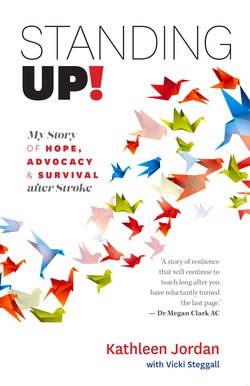Читать книгу Standing Up - Vicki Steggall - Страница 17
На сайте Литреса книга снята с продажи.
ОглавлениеMore silence
Despite my family’s efforts, I remain difficult to rouse in the weeks after surgery. My frequent sighing, big deep sighs, alerts my family to the possibility that I might be depressed and I start being given anti-depressant medication which is known to improve the outcome in stroke. Hoists are needed to move me about and I’m fed through a naso-gastric tube.
I am clearly the most incapacitated of all the patients in the stroke unit. My family, as they walk past the now familiar surrounds of ICU, still feel some measure of comfort that I have at least progressed beyond that balance between life and death. But why have I stopped talking? Why am I non-responsive?
When I do wake, I’m frequently very distressed, but unable to tell anyone why. Everyone’s relief following surgery, when I was blithely issuing instructions (albeit written), and then my spoken (albeit confused) words in the high dependency unit, gives way to real concern over my continuing muteness. Answers are hard to find. My neuropsychologist sister recalls, ‘No-one ever came out and said, the reason Kathleen isn’t talking is … A speech therapist thought she might have oral apraxia (an inability to speak due to damage to the brain) but they didn’t seem to really know.’
The speech therapist, acting on this assumption, tries to teach me to copy sounds. But the decision to treat my silence as apraxia seems misguided to my sister. Increasingly, and in consultation with her peers, she believes my problem is due to disruption of deep centres in the brain and their cortical connections, and that lack of speech was due to my general problems of arousal. ‘Really, we can now see the reason Kathleen wasn’t talking was because she’d had a massive stroke and her brain was so addled. Even though she should have been talking (because she had a right side stroke and language is in the left hemisphere), there just wasn’t enough cerebral activation going on for her to be having these higher-level cognitive processes. She was in survival mode. Her brain and body were just focusing on bodily functions.’
She believes I would benefit from neuropsychological involvement. Looking back at that time, she says, ‘Neuropsychological involvement in the stroke unit would have been so helpful to guide the therapy, support the family and advocate for Kathleen. Kathleen was getting nursing care, including physiotherapy (around support and endurance for sitting), occupational therapy (for one-handed strategies for grooming and starting to scan to the left) and speech therapy (for lip sealing and swallowing). But a neuropsychologist would have helped make sure that what was being done was most beneficial.
‘For example, given Kathleen’s lack of speech and her left-side neglect, we developed our own communication device — a list of single words, such as yes, no, headache which we wrote in a column on the right side of the page for Kathleen to point to. We needed a way of understanding the reasons behind her frequent and obvious distress so that we could help. She was able to use this simple device with some success.’
‘We can say this with some clarity now, but when you’re in the thick of it, you’ve got questions and there are no answers. Sometimes that’s because there are no answers, or there is no access to people who may have the answers. Really, the staff are trying to put the pieces together themselves and even those who were really well intentioned saw it as their duty, I think, to keep us grounded. Things were bad and were going to stay bad for a very long time, if not forever. Their main focus, as they saw it, was to not raise our expectations. But that didn’t help us at all.’
Other people’s modest expectations have to be brushed aside if my family are to believe I will get through this. And that is what they do. Guided by their own inner convictions and knowledge of what a determined survivor I’ve been all my life, they get on with providing me the company and stimulation they think I need. They chat away to me, even though I don’t reply. They talk, letting me know they’re there. In my memory (and it’s backed up by email correspondence), they are always there.
Mark found the best way to communicate during my silence was to sit by my bedside and simply embark on a monologue of his own. It was his brand of cheerful companionship, letting me know that I was still in their lives, but he chatted without expectation of response. Mostly I relaxed at the sound of his voice, but one of his monologues must have gone on too long, even for a bedridden mute. When it concluded, I looked at him and told him that he was driving me up the wall. He took it as a good sign!
In late September, a month after the stroke, Lucinda was able to email everyone that I had spoken a complete sentence. Unfortunately, it wasn’t the best one! Reflective of my limited insight into where I was and what had happened, I turned to my lovely, deeply distressed daughter and said, ‘What a wonderful year you are having, darling!’ She bit back the obvious, ironic reply.
